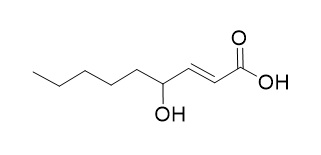trans-4-Hydroxy-2-nonenoic acid
trans-4-Hydroxy-2-nonenoic acid is a marker of lipid peroxidation resulting from the metabolism of trans-4-hydroxy-2-nonenal.It is a gamma-hydroxybutyrate receptor ligand in the cerebral cortex and hippocampus.
Inquire / Order:
manager@chemfaces.com
Technical Inquiries:
service@chemfaces.com
Tel:
+86-27-84237783
Fax:
+86-27-84254680
Address:
1 Building, No. 83, CheCheng Rd., Wuhan Economic and Technological Development Zone, Wuhan, Hubei 430056, PRC
Providing storage is as stated on the product vial and the vial is kept tightly sealed, the product can be stored for up to
24 months(2-8C).
Wherever possible, you should prepare and use solutions on the same day. However, if you need to make up stock solutions in advance, we recommend that you store the solution as aliquots in tightly sealed vials at -20C. Generally, these will be useable for up to two weeks. Before use, and prior to opening the vial we recommend that you allow your product to equilibrate to room temperature for at least 1 hour.
Need more advice on solubility, usage and handling? Please email to: service@chemfaces.com
The packaging of the product may have turned upside down during transportation, resulting in the natural compounds adhering to the neck or cap of the vial. take the vial out of its packaging and gently shake to let the compounds fall to the bottom of the vial. for liquid products, centrifuge at 200-500 RPM to gather the liquid at the bottom of the vial. try to avoid loss or contamination during handling.
Turk J Med Sci.2023 53: 1312-1320.
Plant Physiol Biochem.2019, 144:355-364
J Ethnopharmacol.2017, 206:327-336
Eur J Ther.2023, 29(4):900-906.
Earth Environ. Sci. 2021, 905:012080.
Korean Journal of Pharmacognosy2018, 49(1):76-83
Cell Prolif.2021, 54(8):e13083.
Anat Rec (Hoboken).2021, 304(2):323-332.
Int J Mol Sci.2023, 24(20):15320.
Biomolecules.2024, 14(4):451.
Related and Featured Products
J Neurochem. 2004 Jun;89(6):1462-70.
4-Hydroxy-trans-2-nonenoic acid is a gamma-hydroxybutyrate receptor ligand in the cerebral cortex and hippocampus.[Pubmed:
15189349]
Elevated production of 4-hydroxy-trans-2-nonenal (HNE) occurs in numerous neurological disorders involving oxidative damage. HNE is metabolized to the non-toxic 4-hydroxy-trans-2-nonenoic acid (trans-4-Hydroxy-2-nonenoic acid,HNEAcid) by aldehyde dehydrogenases in the rat cerebral cortex.
METHODS AND RESULTS:
Based upon the structural similarity of HNEAcid to ligands of the gamma-hydroxybutyrate (GHB) receptor, we hypothesized that HNEAcid is an endogenous ligand for the GHB receptor. HNEAcid displaced the specific binding of the GHB receptor ligand (3)H-NCS382 (30 nm) in membrane preparations of human frontal cerebral cortex and whole rat cerebral cortex with IC(50s) of 3.9 +/- 1.1 and 5.6 +/- 1.2 micro m, respectively. Inhibition was attenuated when the carboxyl group of HNEAcid was replaced with an aldehyde or an alcohol. HNEAcid (300 micro m) did not displace the binding of beta-adrenergic receptor and GABA(B) receptor antagonists, demonstrating the selectivity of HNEAcid for the GHB receptor. HNEAcid is formed in homogenates of human frontal cortical gray matter in an NAD(+)-dependent (V(Max), 0.71 nmol/min/mg) and NADP(+)-dependent (V(Max), 0.12 nmol/min/mg) manner. Lastly, (3)H-NCS382 binding is elevated 2.7-fold with age in the cerebral cortex of rats.
CONCLUSIONS:
Our data demonstrate that an HNE metabolite, formed in rat and human brain, is a signaling molecule analogous to other bioactive lipid peroxidation products.
J Chromatogr A. 2007 May 18;1149(2):305-11.
Direct and indirect high-performance liquid chromatography enantioseparation of trans-4-hydroxy-2-nonenoic acid.[Pubmed:
17416373 ]
trans-4-Hydroxy-2-nonenoic acid (HNEA) is a marker of lipid peroxidation resulting from the metabolism of trans-4-hydroxy-2-nonenal (HNE).
METHODS AND RESULTS:
Direct and indirect RP-HPLC methods for the separation of HNEA enantiomers were developed and compared. The indirect method involved pre-column derivatization with a chiral amino agent, (1S,2S)-(+)-2-amino-1-(4-nitrophenyl)-1,3-propanediol, and subsequent separation of diastereomers on a Spherisorb ODS2 column. The direct separation of HNEA enantiomers was performed using the chiral stationary phase, Chiralpak AD-RH.
Validation parameters including limit of quantification, linear range, accuracy and precision were determined.
CONCLUSIONS:
The indirect separation method was successfully applied for the determination of enantiomeric ratio of HNEA in rat brain mitochondrial lysate, and showed that HNEA was formed (R)-enantioselectively from HNE.



